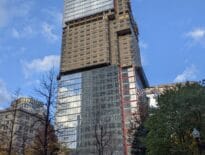
Life science tenants need to consider unique elements of their real estate operations when negotiating leases with landlords. Anchor Line Partners and Northwood Investors broke ground in late 2021 on the 227,000-square-foot 245 Fifth Ave. development in Waltham after receiving $277 million in financing from RBC Real Estate Capital Corp. Image courtesy of Perkins + Will
With its abundance of educational and healthcare institutions engaged in innovative research and development programs, Massachusetts is experiencing much real estate activity associated with life sciences. Landlords and tenants should consider several issues before making financial commitments to life science projects.
Permitting is a threshold issue for laboratory uses. Life science tenants should not sign leases without assurances that necessary governmental permits are obtainable. Tenants that fail to secure permits are not excused from lease obligations. The Massachusetts Biotechnology Council (MassBio) has laid groundwork in this area. It ranks Massachusetts municipalities based on the availability of lab sites. Communities earn “gold” ratings if they have sites pre-permitted for biotech uses, or buildings where biotech activities are under way. Communities can earn “platinum” ratings if they have shovel-ready permitted sites that have completed review under the Massachusetts Environmental Policy Act. The list of gold and platinum rated communities is easily accessible at MassBio’s website.
Planning for Growth
Life science firms should anticipate future growth. Flexible short-term licenses in shared laboratories can work for startups, but as firms develop marketable products and attract Series A funding, they will graduate into fixed-term leases of specially designed facilities. Life science firms must identify landlords with financial resources to build out space properly, and avoid long-term commitments to spaces they expect to outgrow.
Tenants should have lawyers review leases in advance, to avoid unpleasant surprises. A Massachusetts medical device manufacturer encountered such unpleasantness in SpineFrontier Inc. v. Cummings Properties LLC.
The tenant originally signed a one-year lease for 331 square feet. The lease automatically renewed for five years unless the tenant notified the landlord otherwise by constable, certified mail or courier service. The parties later amended the lease to expand the tenant’s premises and extend the lease term. Before the scheduled expiration, the tenant emailed its landlord a non-renewal notice. The landlord claimed that the emailed notice was inadequate and the lease renewed for five years. It demanded $1.7 million in accelerated rent. The Massachusetts courts ruled that the emailed notice and the parties’ other communications were sufficient to terminate the lease, thus rescuing the tenant from disaster.
Subletting and Landlord Access
Most landlords offer standard lease forms that prohibit tenants from assigning the lease or subletting space. This is unworkable for life science tenants whose business plans involve sales of their businesses to pharmaceutical companies or collaboration with other firms and scientists. Landlords and tenants of laboratory space need to modify assignment and sublease clauses to accommodate such business plans.
Landlords usually reserve rights to enter the leased premises for numerous reasons, including inspections and repairs, and showing properties to lenders and investors. However, widespread access rights are inappropriate where tenants develop intellectual property or conduct laboratory activities involving hazardous materials. Tenants need to make sure that “clean rooms” and other areas are off-limits to landlords.
Environmental Issues
Environmental issues are of particular concern in “wet labs” where tenants handle biological or radioactive materials or chemical solvents. According to Kevin Malloy, a principal at Avison Young who specializes in life science real estate transactions, “Landlords look to push all risks involving hazardous materials to tenants. They are also concerned about tenant operations impacting property insurance levels. Local fire chiefs have an active role in shaping building hazmat policy especially in urban environments. They often require thorough code review and hazmat storage and use permits from tenants.”

Christopher Vaccaro
The condition of the premises at lease expirations is critical. Landlords cannot afford to remove vacant space from the rental market while cleaning up after prior tenants. In Prospect Hill Acquisition, LLC v. Tyco Electronics Corp., the lease required the tenant to remove “all equipment, ducts, fixtures, materials or other property that are or might be contaminated” when the lease expired. The landlord refused to accept the premises at lease expiration, because cyanide was found in the concrete floor. The landlord required that the tenant remove the contaminated flooring, while charging the tenant triple rent as a holdover tenant.
A federal appeals court ruled that the phrase “equipment, ducts, fixtures, materials or other property” in the lease referred to moveable objects, not the concrete floor, and the lease did not obligate the tenant to remove it.
Commercial real estate experts learned during the COVID pandemic that the office and restaurant leasing markets are less stable than hoped, and demand for laboratory space presents opportunities. When exploring these opportunities, all participants should educate themselves on special issues affecting the life science industry.
Christopher R. Vaccaro, Esq. is a partner at Dalton & Finegold, L.L.P. in Andover. His email address is cvaccaro@dfllp.com.





